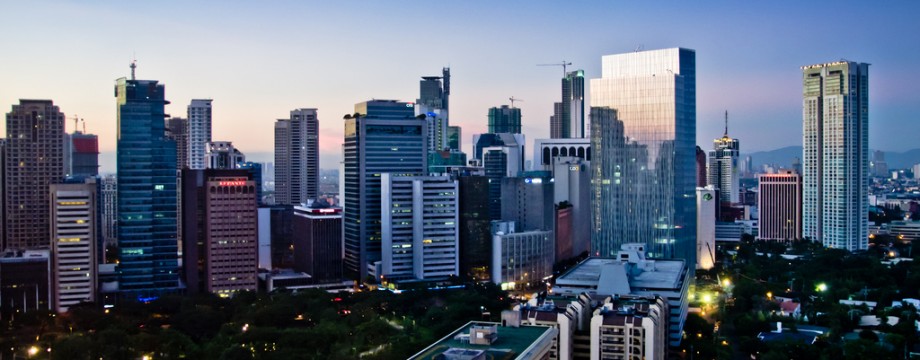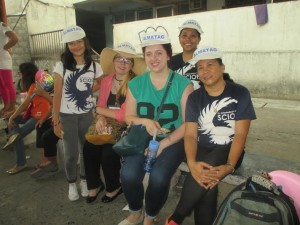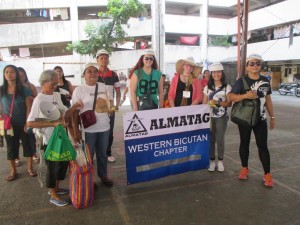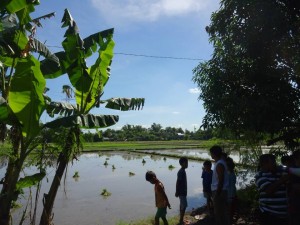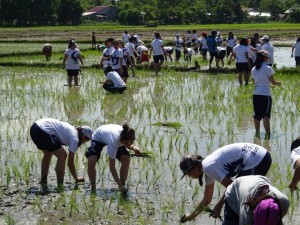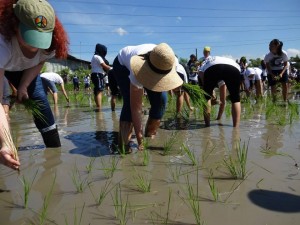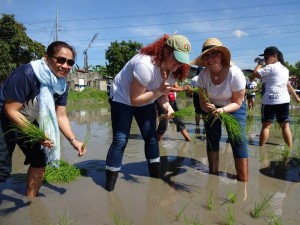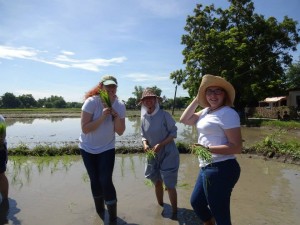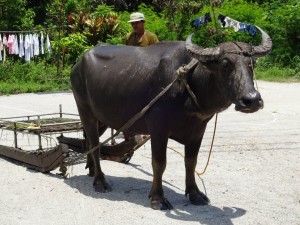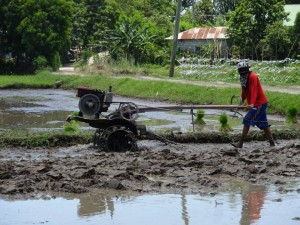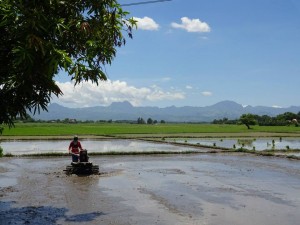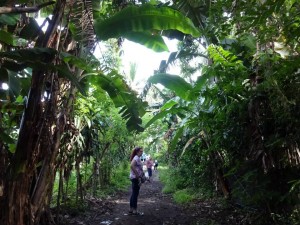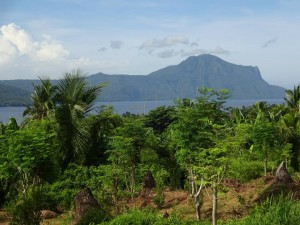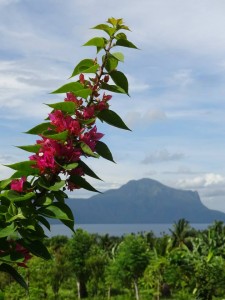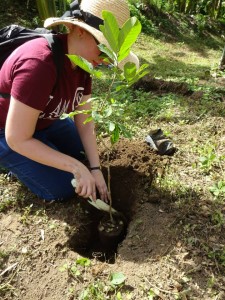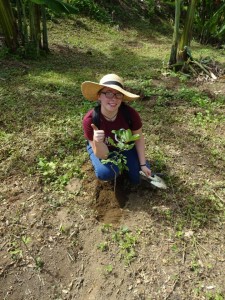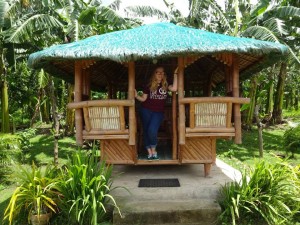We’ve gotten the chance to go along on some interesting community exposure and outreach trips during our time here. St. Scho has two service-learning/community outreach classes that are required of first and second year students: the Scholastican National Service Training Program ([S]NSTP) and their Lay Apostolate Program. The NSTP is something that the Philippine government requires for all schools, and it provides students with the opportunity to engage with the oppressed and marginalized groups in society through community service and urban and rural exposure. The Lay Apostolate Program, however, is specific to St. Scholastica’s (also required to graduate) and is a deepening of this experience through an individual community assignment and student-developed action program, as well as a further way to explore the ethics and spirituality around service. I’ve learned a lot through my exposure to the communities I’ve seen here, and I’ve gotten to experience a ton that a normal tourist would never see. I’m so glad I was able to be a part of seeing this side of the Philippines. Below I’ll share my experiences at a political rally concerning land rights in Taguig City, being hosted by a rice farming community in Pampanga, and visiting a Women’s Prison in Mandaluyong.
Politics in Taguig
A few weeks ago, the College Outreach Center of St. Scholastica’s invited Kelsey and I along to a rally in Taguig City – a residential area in MetroManila, but outside of the city proper. It was a very poor community far off the beaten tracks for tourists or visitors. Kelsey and I turned quite a few heads while walking through the narrow streets lined with shambling structures and children playing marbles in the cracks in the pavement.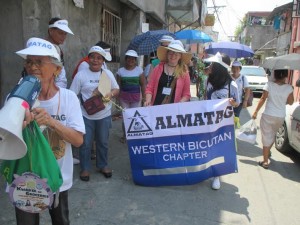
Taguig is comprised of eight districts (called barangays) that were at one time a military reservation and the subject of Proclamation No. 172 issued under former president Corazon Aquino. This 1987 proclamation passed ownership of the land onto the residents in the eight barangays at the time, but as of today only 30% of people living there have titles proving that they (or their families from whom they have inherited) were the beneficiaries of the time and own the land they live in. As it currently stands, investors have their eyes on the land surrounding Taguig and wish to buy it and develop it – their plans include building a casino and hotel for rich investors who want a retreat from urban Manila. The government seems all too happy to sell it and allow the demolition of homes and communities where thousands of families currently live, unless the populace can mobilize to push for titles and recognition of the ownership that was granted to them decades ago.
We met with leaders of the Western Bicutan Chapter of ALMATAG, a groundswell movement fighting for land rights among the Taguig barangays, in one of their homes in this community, and we marched with them to a nondescript amphitheater in the city center where hundreds of the community members were gathered to learn about the issue and how to petition the government to issue their rightful titles or apply for one. Although to my over-privileged Western eyes this looked like a maze of dirty alleyways filled with lean-to’s and shacks or bare concrete structures, here were hundreds of people fighting for their homes, their community, the land that was rightfully theirs, and consequently their livelihood, and seeking out education about how to make a difference. It was very humbling for my own perspective, and an eye-opening introduction to “the Philippine poor” as people with dignity and a sense of pride in their home and community.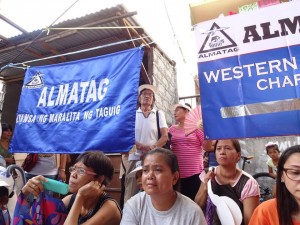
It reminded me a bit of the issues regarding land rights for our own North American indigenous peoples, and how the government continuously tries to violate its own treaties with the Native tribes who have to fight to be recognized as sovereign. Most recently, the big issue was over the proposed Keystone XL pipeline that would have run through the Ogalala Aquifer in Lakota reservations in South Dakota, a water source that provides a good portion of America with clean drinking water, and sacred land to the Lakota. Although that battle was won, land rights violations regarding mining, hazardous waste dumping, and seizure continue to be common in tribal reservation land.
In this exposure experience, I also learned quite a bit about the politics of the Philippines, which is notoriously corrupt. During the SLT in Baguio I attended several weeks ago, Prof. Rita Cucio described Philippine politics with the acronym “EPPPAL,” evoking a Filipino expression meaning something akin to “thick-skinned” or “stone-faced,” and standing for:
E litist
P ersonality Oriented
P ragmatic and Opportunistic
P atronage Politics
A narchic Dynasties
L andlordism and Warlordism
Some of these, like the first two, are familiar to Americans (although that’s not the Filipino perception – I’ll discuss this). Some of these, however, are problems more specific to the Philippines. For example, “pragmatic and opportunistic” refers to the fact that many politicians will switch parties after being elected to office – catering to the population that will get them elected on popular vote and then changing loyalties. It’s said that everyone is “for the poor” when campaigning, because the very poor make up 70% of the population, but when in power they’ll capitalize on those that will fund them and help them stay in power. Which brings me to the patronage system. Apparently it’s not uncommon for politicians in office to dole out favors to people in the community as if they’re being funded out of pocket – look, I helped this man’s ailing mother with her hospital bills, and I helped this mother with funds to repair her home after the flood damage – I’m a nice person! In reality, these favors are ways of obligating votes from the populace with government money entrusted to them from public coffers. Hard-earned taxed income goes not into community development, public services and infrastructure like it’s intended, but is depleted by corrupt politicians who use it to secure votes for re-elections. Politics here, despite being “democratic,” also appear to be dynasties: if you look at the people who are currently in office, chances are they have several relatives who preceded them or are current officials aside them. This is a challenge to the system of checks and balances: how can you be fair and impartial towards the activities of your brother or father? How can you blow the whistle on a cousin or uncle who helped you get your position? It’s also a challenge because oftentimes legacy politicians are elected when their only qualification for office is their last name. Finally, some even resort to bullying, intimidation, and the employ of private armies to protect themselves – sometimes even outright murder – to be elected or to stay in office. Although the human rights violations and martial law under President Ferdinand Marcos are fairly well-known, one of the most recent renowned cases of this was the presidency of Gloria Macpagal-Arroyo (2001-2010). By the end of her terms in office, she was suspected of extrajudicial killings, torture and illegal arrests, and even rumored involvement in the Maguindinao Massacre in the South that led to the murder of 57 people, 34 of the journalists who were would-be whistle-blowers on corruption.
Much to my amusement, American politics were held as the standard for good democracy in the presentation I sat in on. We were hailed for our minimal corruption, and the clarity and directness of our politicians who participate in debates so everyone knows where they stand on issues and where they can be trusted to say what they mean. Although we don’t practice anything as extreme as party-switching and one can generally expect certain things from Democrats and Republicans (there is no such rigid party system here and much of any one candidate’s platform is a mystery), I had to reluctantly inform the presenter and the other students that things were not quite so rosy here.
Rice Planting in Pampanga
Getting to spend a day in Barangay San Pablo with the rice farmers was such an interesting experience. For me, an outsider and a foreigner, spending 20 minutes in the rice paddies bending over, squelching through mud that tried to cement my feet into place and was unwilling to relinquish my rain boots, and sweating under the hot sun was bearable and even kind of fun. I relished it as a picture-taking opportunity, knowing it would be something cool to show people back home what I had done. However, thinking about the that hard labor as an all-day, every-day way of life for farmers in Pampanga and throughout the rural countryside made me feel so guilty and privileged. Trying to answer Tatay’s (“Father,” the leader of his community’s Farming Coalition Group who hosted us) questions about agriculture in the States made me uncomfortable with the wealth of the place I come from. In the States, farming can be high-tech – tractors that drive themselves and have programs that tell it where to plant what crop. Here they do not even have tractors. They have man-powered machines and carabao plows. Also, I think farming in the States tends to be romanticized as the quintessential American lifestyle which espouses all of the values of the Heartland – simplicity, hard work, and honest occupation over love of land. Farmers are a patriotic bunch, the good ‘ol Country boys. Here in the Philippines, it seems that being a farmer is the equivalent of being a peasant – farming is for the distastefully uneducated and backward people, and even makes one suspicious! (Tatay told us about government raids that had been done in the area and in his home, because any organized rural group such as his Farming Coalition is suspected of rebellion.) 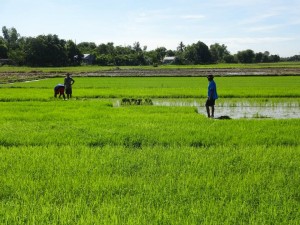
Of course, we also heard about the struggles due to corruption. One of the successes of the organized group of farmer’s was getting their voices heard about their need for irrigation and running water. A dam was built, but now that water is being used to make a profit for the chairman in charge of routing the water – a necessary resource hard-won and meant to be shared by everyone is being withheld and used as extortion. I was also moved when Tatay was asking Kelsey and I about our college education and telling us that he had wanted to go to school, but his father had not been able to afford to give him an education. Kelsey and I pay tuition in a sum that would boggle the minds of even middle-class Filipinos. How could I not be moved and feel guilty over my good fortune and his missed opportunity? (Of course, Kelsey and I both receive substantial scholarships and are eligible to borrow from the government and repay our loans after graduation. Although student loan debt in the US can be crippling and life-long, we at least have the option to take the consequences and invest in our education – something Tatay was not able to do.)
But despite all these differences and feeling worlds apart in this rural rice farming community from our private university life in the States, I was amused to find myself singing along to Passenger and Demi Lovato playing on the phones of one of the laborers they employ to help with the fields. Maybe we aren’t so different after all.
Correctional Institute for Women in Mandaluyong
I got so much out of this experience. I had heard that Filipino jails are really bad, but that’s not what I found at all (although I was shocked at the lax security – just having to check our bags and belongings and going through a cursory pat down, but no metal detectors!). The prison was just like a community, and we entered while they were having a videoke hour. The inmates have one of three color tshirts, which indicate the length of their sentence and the level of security they have, but other than that, it could have been a village anywhere else in Metro Manila. We sat down for an Orientation and learned about the jail, but afterwards we got the chance to speak with one of the teachers there (who was an inmate herself). Many of the women there are very poor and unable to read or write. Many of them are victims of their situation and circumstance or scapegoats – too poor and illiterate to defend themselves or to afford a lawyer. Many of them are also mothers – some of whom had children too young to remember them when they were put away and who worry how their children will receive them when their sentence ends. But because there are so many mothers and family is important, they get a 3 minute call to immediate family every day, just to check in. They also allow inmates to Skype with their family if they’re from provinces and visiting is hard, or to leave the jail (accompanied, of course) to attend the funeral of loved ones who may have died. While in prison, these women are being taught skills (like how to read and write) and other livelihood things – many women make products that can be sold, and they get to send a portion of their sales home to their families.
I’m really impressed by how hopeful these women are, and rightly so. They’re learning skills, and there will be opportunities for them when they get released. In the United States, however, there are so few opportunities for ex-offenders: they’re unemployable and ineligible for government assistance in food and housing. “Rehabilitation” efforts are often futile because of the limits that exist for those with a criminal history. Oftentimes there’s no other course of action but to fall back into desperate measures to make a living, and then they’re hit with a renewed sentence and they go right back into the system. Here in the Philippines, there are many ways to make a living on “unofficial” work: as a seamstress, a laundress, a factory worker, a pedicab driver, the owner of a cornerside sari-sari store, etc. While unregulated work in the Philippines can sometimes present problems in and of themselves, it certainly helps the oppressed and provides an advantage we don’t have in America. Although we claim to be “the land of the free,” we have a major problem in our prison system, and boast the highest number of incarcerated citizens in the world. So visiting the women in Mandaluyong was a nice change of pace.
Bonus: Tanauan Tree Planting
Although this isn’t really “Outreach,” we also had a day of going south to the Batangas province and visiting St. Scholastica’s Farm and Mini-Forest in Tanauan with some German high school students who are visiting from a Gymnasium in St. Otillien. After a short trek up a hill through lush tropical forest, we emerged to breathtaking views of Lake Taal – seeing the Lake and the Volcano from another view than when we looked down on them while in Tagaytay. It was a beautiful day, and after taking in the sights and snacking, the group of us took a little tree to plant somewhere in the forest. It’s so cool to think that that little tree will grow tall and remain on Philippine soil long after I have left it. I feel that I’ve left a mark on this country, albeit in a small way.

